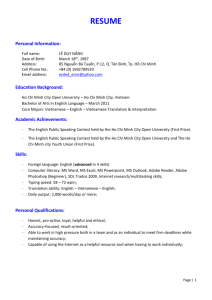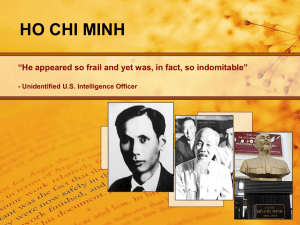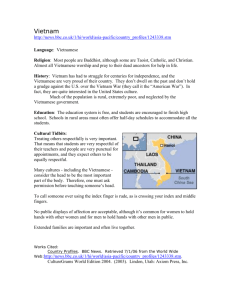Click here to view my artifact.
advertisement
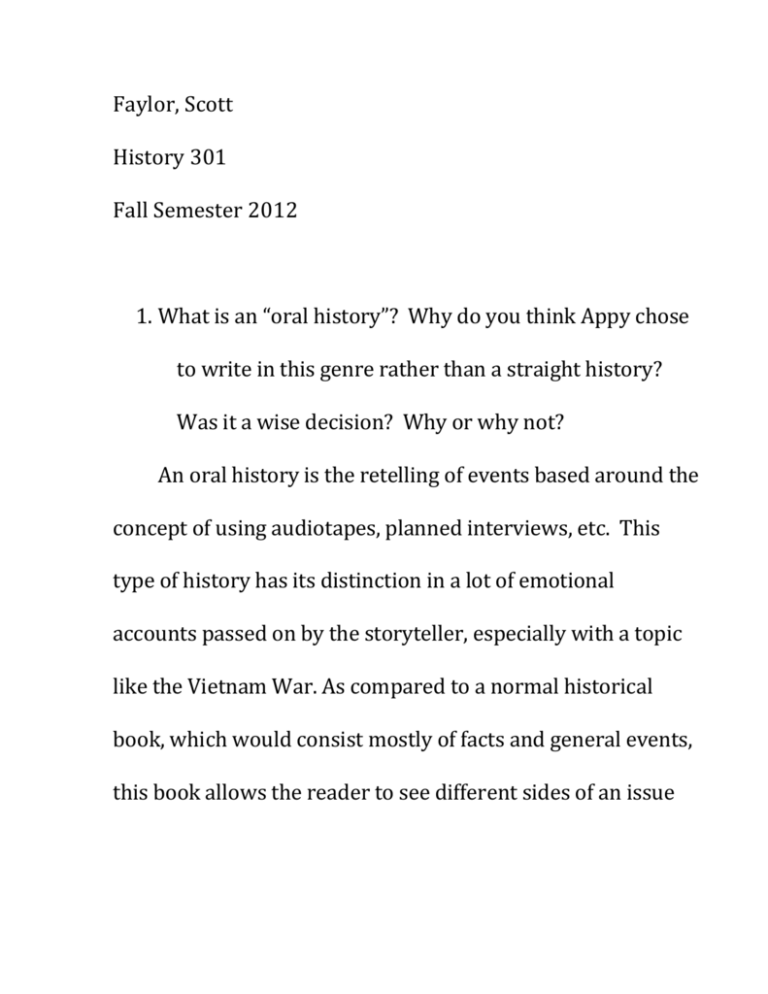
Faylor, Scott History 301 Fall Semester 2012 1. What is an “oral history”? Why do you think Appy chose to write in this genre rather than a straight history? Was it a wise decision? Why or why not? An oral history is the retelling of events based around the concept of using audiotapes, planned interviews, etc. This type of history has its distinction in a lot of emotional accounts passed on by the storyteller, especially with a topic like the Vietnam War. As compared to a normal historical book, which would consist mostly of facts and general events, this book allows the reader to see different sides of an issue or event, which is very important when passing judgment or gaining knowledge about a subject. As Appy says himself: “What might happen to our conception of the Vietnam War if we simply began to hear the accounts of American veterans alongside the memories of Vietnamese who fought with and against them?” (Appy XV) This alone speaks volumes about the way textbooks are written and about the bias that can arise from it. I believe that Appy’s decision to write in this manner was a wise one for one very important reason: It allows this book to be different from others. By writing in this manner, Appy has made it possible to see a devastating conflict in a new way, and this allows the reader’s knowledge to expand, which is the reason for writing a book in the first place. 2 What is the significance of the epigram which begins Chapter One: "Vietnam is nobody's dog"? The quotation from Nguyen Co Thach is very significant as it shows us the mindset of the Vietnamese people during the Vietnam War. Their mindset was, “We will not be told what to do, not by anyone, and we will oppose anyone who tries to tell us otherwise.” As Ho Chi Minh states, “The Americans…can wipe out all the principal towns of Tonkin…we expect it, and, besides, we are prepared for it. But that does not weaken our determination to fight to the very end. You know, we’ve already had the experience, and you have seen how that conflict ended.” (Olson and Roberts 1) This quote is very telling when it comes to the idea of the stubbornness and resilience of the Vietnamese during this conflict. In the past, Vietnam was in conflict with the much larger, supposedly stronger nations, like France, China, and Japan, but despite the odds, the Vietnamese were able to withstand the pressure and continue their own way of life. Because of this, when the Americans began to invade, the Vietnamese were able to have faith in their ability to stave off invaders and come out of the conflict victorious. Because of this mindset, the Vietnamese were able to maintain strong and resilient, even in the face of impending doom. 3. Explain the significance of the poem on page 5 of Olson and Roberts. The poem on page 5 shows the general distaste for the wealthy elite class of Mandarins in Vietnam during the time of French Imperialism. This upper class maintained the ways of the Chinese when they ruled the area up until 938, however, the locals would still maintain the core values and traditions of the Chinese, including their language, their religion, and the politics of the Chinese, such as the tax system and bureaucracy. This maintained social system led to many problems between the Mandarins, and the Vietnamese lower class. This use of Chinese values was put in place to move up in the Vietnamese society. “To pass the civil service examinations and secure the best jobs, Vietnamese scholars immersed themselves in the Chinese language and Confucian values, which gradually distanced them from the Vietnamese peasants. (Olson and Roberts 45) As the poem shows, this strong caste system obviously caused many problems and distrust between the two classes. On top of that, the Mandarin class was extremely conservative, and was a deterrent for most advancement, whether it be through technology, science, religion, it was all shut down in favor of the Confucian and Mandarin values. All of this led to the “savage country” that the French inherited through their imperialistic ventures. 4-5. Explain the significance of the views of Phan Boi Chau and Phan Chu Trinh? How did the differ? How did they influence Ho Chi Minh’s nationalist views? Phan Boi Chau’s ideas laid in the ideas of radical violence to bring the Vietnamese back to prosperity, much like Malcolm X was for the American Civil Rights Movement. Phan Boi Chau also believed that the key to giving the Vietnamese power, was to destroy the French bureaucracy first, allowing the Vietnamese to rule themselves. His views on using violence to get ahead were also very prevalent. “Phan Boi Chau led the abortive Poison Plot, in which lowranking Vietnamese soldiers tried to poison French officers in Hanoi.” (Olson and Roberts 8) This plan didn’t go through as intended, but the legacy of Phan Boi Chau as a violent revolutionary for Vietnam lived on. Phan Chu Trinh, on the other hand, was a nationalist who based his revolutionary ideas around forcing out the Mandarin elite, while working peacefully with the French to give the power back to the Vietnamese. To continue with the American Civil Rights Movement analogy, Phan Chu Trinh would take the role of Martin Luther King Jr. Trinh would rather be peacefully disobedient than resort to violence to resolve the matter. These two revolutionaries influenced Ho Chi Minh in different ways. Phan Boi Chau showed Minh that the only way to get rid of the French was through violent action, while Phan Chu Trinh “came the certainty that the mandarin system was rotten, corrupted by its elitism and its hostility to the modern world and its technology.” (Olson and Roberts 8) These two radical’s ideas had a large effect on the young Ho Chi Minh, causing his more radical views later in life. 6.-7 "The French were kind imperialists who genuinely wanted to help the Vietnamese." Do you agree or disagree? Why? I have to disagree with this quote, for a couple of reasons. The first being from the book: “Many peasants lost their property because they could not pay high French taxes, could not contest claims against the land in French courts, or fell into debt to French or Vietnamese creditors who foreclosed on their property.” (Olson and Roberts 5) As stated in the book, the number of impoverished people was pretty high before the French Imperialists took over, but the number hit a new high after the French takeover. It eventually became so bad that “In Tonkin nine percent of the population came to own 52 percent of cultivated land, and 250 people owned 20 percent.” The French came to own the monopolies on all the resources in Vietnam, and barely any sort of payment went back to the people. My next point has to do with the very core ideals of Imperialism. The entire point of Imperialism was to take control of a region, and then use its people to gain resources that your country did not already have, thereby gaining income and new markets for your country. Never was the goal to genuinely help the country that you took over, it just wasn’t feasible. Even the United States didn’t take this viewpoint when the controlled the Philippines. This quote is completely to the contrary of the point of Imperialism, which was essentially get in, get resources, leave the land and the people exhausted. If their intention were truly to help the country out, then they would not have entered the country forcefully, and would have worked together to better Vietnam as a whole. The results of this speak for themselves. 8. Why did Ho Chi Minh become a Communist? Ho Chi Minh’s Communist views started very early in his life, as a result of his growing up in a society where the caste system was extremely prevalent. By being born into a lower class family, he was surrounded by inter-class conflicts, which were brought on by the Imperialistic French and the Mandarin elites. The true conversion came about when a French Communist showed Ho Chi Minh Vladmir Lenin’s “Thesis on the National and Colonial Questions.” (Olson and Roberts 10) This text stated that imperialism was a direct result of the greed of corporations trying to gain more money through capitalism. This idea of imperialism stuck with Ho Chi Minh because he witnessed this idea firsthand during his younger days in Vietnam. (Olson and Roberts 7) Second, in Lenin’s text, he stated that the other enemy was the Asian Feudalists, who had been oppressing the masses for too long. The only solution to this problem was to rebel against these institutions, which had been in power for so long. These ideas played well with Ho Chi Minh’s own childhood, where he was poor and oppressed by imperialists and Mandarins alike. 9-10. What was Ho Chi Minh's attitude toward the United States before 1946? Was he justified in his attitude? Why or why not? Ho Chi Minh had always been fascinated with the American Way. He had seen how the American Capitalism system worked, and he knew it was bad, but he also saw a positive side to the United States. He saw opportunity to take after them in their own revolution, “The Americans, after all, been the first colony to revolt successfully against a European imperial power, and their Declaration of Independence was eloquent in its proclamation of human equality.” (Olson and Roberts 15-16) The American Imperialism system was also of great intrigue to Ho Chi Minh. He was used to a system where the country that invaded would be a power hungry tyrannical monster that would be corrupt and never leave the country alone. The Americans, however, took a different route than he had anticipated. Although the Americans did have a bloody conflict, they did it with the intention to free the Philippines from Spain, and would help them achieve independence. “…Afterwards the Americans made good on their promise. The Tydings-McDuffe Act of 1934 launched the Philippines on the road to independence, with a twelveyear timetable before the American withdrawal.” This was a new concept for Ho Chi Minh, as he wasn’t used to an imperialistic country that stuck to its word and actually helped out the country it was involved with. This was a justifiable reason to have a good opinion of the United States, as we were the best candidates to help the Vietnamese through their Revolution. Also, based on previous experience of the United States’ imperialistic tendencies, it seemed that the Americans would be the most helpful. Also, the Americans hatred of the Japanese during this time would also play in their favor, as the Vietnamese had recently ousted the Japanese from their country, so they had that going for them, as well. What is the value of the artifact discussed in the video attached to this lesson? The value of the artifact shown is through its value as a cultural symbol. As noted in the video itself, the fact that the iron has artistic qualities to it says a lot about the culture and mindset of the Vietnamese people. As the video states, compared to an American iron, which is just a piece of metal with a plastic handle, it shows so much more work and thought put into the design and use of the item. The fact that the iron has art on it shows that the Vietnamese took great pride in the tools they used, and that even things that would be considered trivial to modern America, they considered to be very important and a gift to their people. Obviously we did not see what the symbols were or what they said, but it could be reasonable to state that they may have been something involved with a prayer to their God, or even a story for their children to pass along. Either way, the time and effort that was obviously put into the iron shows a very large distinction to the mass-produced, ordinary irons that we use in the United States.
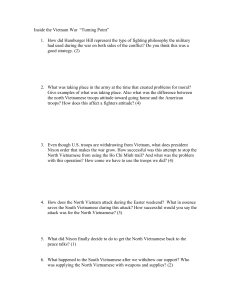
![vietnam[1].](http://s2.studylib.net/store/data/005329784_1-42b2e9fc4f7c73463c31fd4de82c4fa3-300x300.png)
